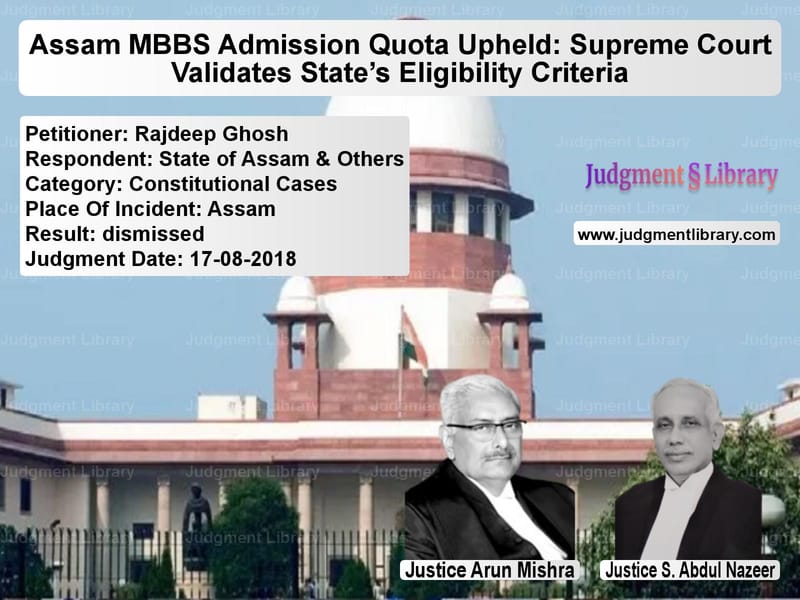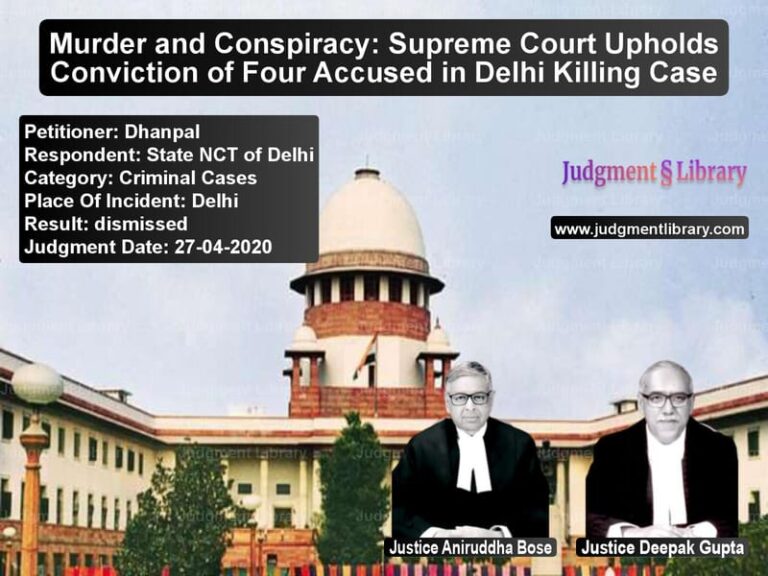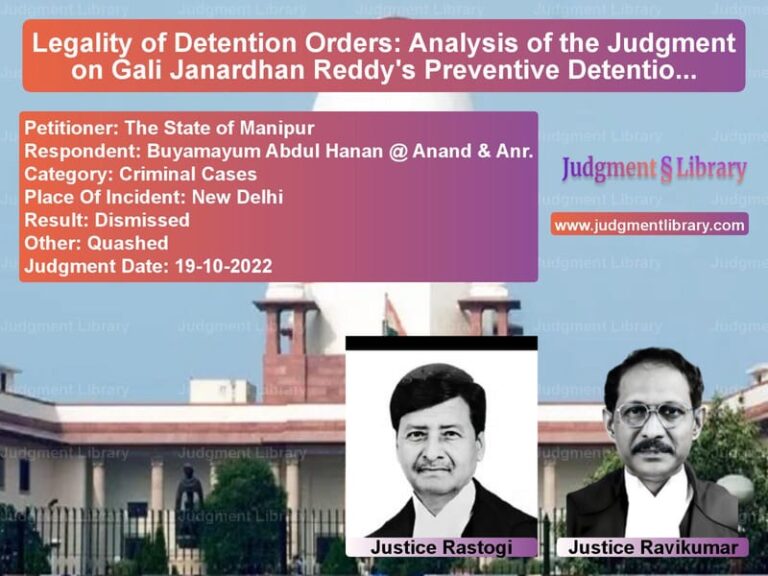Assam MBBS Admission Quota Upheld: Supreme Court Validates State’s Eligibility Criteria
The Supreme Court of India has delivered a landmark judgment in the case of Rajdeep Ghosh v. State of Assam & Others, upholding the constitutional validity of Rule 3(1)(c) of the Medical Colleges and Dental Colleges of Assam (Regulations of Admission into 1st Year MBBS/BDS Courses) Rules, 2017. This rule mandates that candidates must have completed their schooling from Class VII to XII within Assam to be eligible for state quota medical seats. The judgment, delivered by Justice Arun Mishra and Justice S. Abdul Nazeer, has significant implications for medical admissions in the state.
The case was brought before the Supreme Court by several petitioners, including the lead petitioner, Rajdeep Ghosh, who contended that the rule was arbitrary and violated their fundamental rights under Article 14 of the Indian Constitution. The state government, however, defended the rule as a necessary measure to ensure that medical education in Assam benefits students with a long-term commitment to serving the state. The Supreme Court, after analyzing legal precedents and arguments from both sides, dismissed the petitions and upheld the state’s eligibility criteria.
Background of the Case
Medical education in India is highly competitive, and state governments often establish domicile-based reservations to prioritize local candidates for admission to government medical colleges. The Assam government framed the 2017 rules to ensure that MBBS admissions under the state quota are granted only to students who have studied within the state for a significant period.
The primary contention of the petitioners was that Rule 3(1)(c) imposed an unreasonable restriction by mandating that a student must have completed schooling from Class VII to XII within Assam. Many students, despite being permanent residents of Assam, were studying in other states due to better educational facilities and coaching centers. The petitioners argued that such a condition unfairly excluded otherwise eligible candidates from securing state quota seats.
Arguments by the Petitioners
The petitioners, through their legal counsel, raised several points challenging the validity of Rule 3(1)(c):
- Violation of Article 14: The petitioners argued that the rule created an unreasonable classification, distinguishing between students who studied within Assam and those who studied outside the state despite being permanent residents.
- Lack of Rational Nexus: They contended that no empirical study had been conducted to demonstrate that students who studied outside Assam were less likely to serve the state after completing their MBBS degrees.
- Discrimination Against Private Employees: While the rule provided relaxation for students whose parents were government employees posted outside Assam, it did not extend the same benefit to children of private-sector employees working outside the state.
- Impact on Merit: The restriction prevented academically qualified students from competing for state quota seats solely based on their place of schooling.
- Existing Bond Requirement: The state already required medical students to sign a bond obligating them to serve in Assam after graduation. Thus, the additional restriction was unnecessary.
Arguments by the State Government
The state of Assam, represented by its legal team, defended the rule on the following grounds:
- Ensuring Commitment to Assam: The rule aimed to prioritize students who had spent a substantial period in the state, increasing the likelihood that they would continue serving in Assam.
- Addressing the Shortage of Doctors: Assam faced a significant shortage of medical professionals, particularly in rural areas. By ensuring that students had deep-rooted connections to the state, the government sought to mitigate this issue.
- Legitimate Domicile-Based Preference: The state was entitled to establish reasonable eligibility criteria for admission to its educational institutions, as upheld in various Supreme Court judgments.
- Previous Judicial Precedents: The state cited past Supreme Court rulings that upheld similar domicile-based reservations as constitutionally valid.
Supreme Court’s Observations and Judgment
The Supreme Court carefully examined the constitutional validity of Rule 3(1)(c) in light of legal precedents. The key observations of the Court were as follows:
- Rule 3(1)(c) Based on Intelligible Differentia: The Court held that the rule was based on a rational classification that had a legitimate objective—ensuring the availability of doctors within Assam.
- Not Arbitrary or Discriminatory: The classification was deemed reasonable as it ensured that medical education primarily benefited students with long-term commitments to Assam.
- Domicile-Based Reservations Are Valid: The Court reaffirmed that states could implement domicile-based preferences in professional education, provided they were backed by legitimate policy objectives.
- Precedents Support the State’s Stance: The Court cited past judgments such as Dr. Pradeep Jain v. Union of India and D.P. Joshi v. State of Madhya Bharat, which upheld similar domicile-based preferences.
- Impact on Private Employees’ Children: The Court ruled that children of private-sector employees working outside Assam could not claim an equal footing with those whose parents were posted outside due to government duty.
- Not an Unreasonable Restriction: The Supreme Court concluded that the rule did not violate Article 14, as it was not an absolute exclusion and did not completely bar students who studied outside Assam from competing for seats.
Conclusion
The Supreme Court’s ruling in this case sets an important precedent for state governments implementing domicile-based reservations in professional education. The judgment confirms that states have the right to frame eligibility criteria that ensure medical education primarily benefits students with deep-rooted connections to the state. While the ruling may have impacted several students who studied outside Assam, the Court emphasized that such policies are necessary for balancing educational opportunities with the state’s long-term healthcare needs.
With this verdict, the petitions challenging Rule 3(1)(c) of the Assam Medical Admission Rules, 2017, were dismissed, affirming the constitutional validity of the state’s admission criteria.
Petitioner Name: Rajdeep Ghosh.Respondent Name: State of Assam & Others.Judgment By: Justice Arun Mishra, Justice S. Abdul Nazeer.Place Of Incident: Assam.Judgment Date: 17-08-2018.
Don’t miss out on the full details! Download the complete judgment in PDF format below and gain valuable insights instantly!
Download Judgment: Rajdeep Ghosh vs State of Assam & Oth Supreme Court of India Judgment Dated 17-08-2018.pdf
Direct Downlaod Judgment: Direct downlaod this Judgment
See all petitions in Fundamental Rights
See all petitions in Constitution Interpretation
See all petitions in Legislative Powers
See all petitions in Public Interest Litigation
See all petitions in Separation of Powers
See all petitions in Judgment by Arun Mishra
See all petitions in Judgment by S. Abdul Nazeer
See all petitions in dismissed
See all petitions in supreme court of India judgments August 2018
See all petitions in 2018 judgments
See all posts in Constitutional Cases Category
See all allowed petitions in Constitutional Cases Category
See all Dismissed petitions in Constitutional Cases Category
See all partially allowed petitions in Constitutional Cases Category







